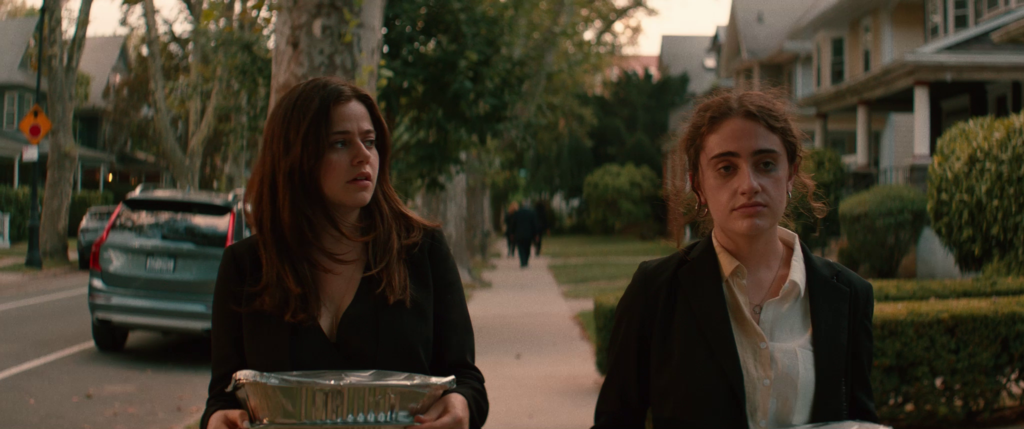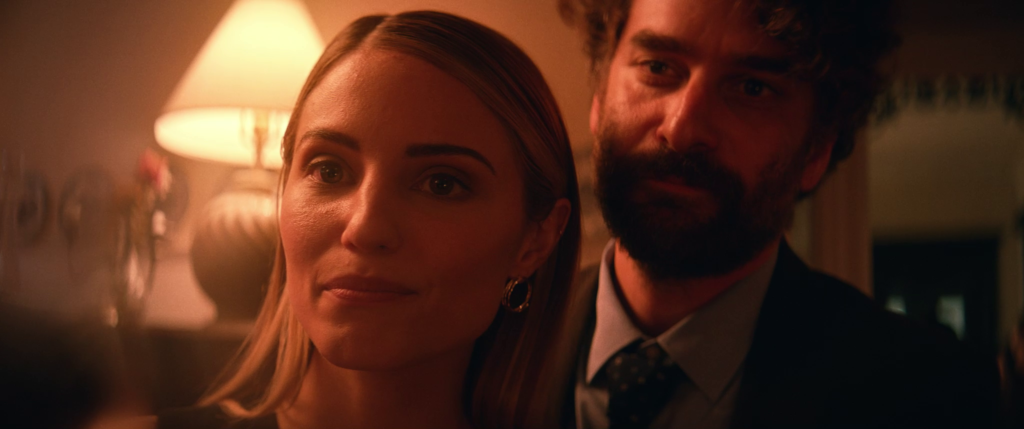August 25, 2023
by Carla Hay

Directed by Emma Seligman
Culture Representation: Taking place in New York state, the comedy/drama film “Shiva Baby” features an all-white cast of characters representing the middle-class.
Culture Clash: A bisexual college student, who secretly makes money as a sex worker for male clients, finds herself in uncomfortable situations when she, her parents, her ex-girlfriend, a sex customer and his wife all end up at the same post-funeral reception.
Culture Audience: “Shiva Baby” will appeal primarily to people who are fans of sarcastic and well-acted movies about people who have secret lives.

“Shiva Baby” seamlessly blends hilarious comedy and sobering drama in this incisive story of a college student forced to reckon with secrets and lies during a tension-filled shiva reception. It’s a stellar feature film debut from writer/director Emma Seligman. The movie authentically represents American Jewish culture (almost every character in the movie is Jewish), which is a big part of the story, but the essential elements of the plot could have been about people in many other cultures.
Seligman is also one of the producers of “Shiva Baby,” which was selected to have its world premiere at the 2020 SXSW Film Festival, but the event was cancelled due to the COVID-19 pandemic. Jury prizes were still given for the event. “Shiva Baby” went on to win the John Cassavetes Award at the 2022 Film Independent Spirit Awards, presented to the creative team of a film with a production budget of less than $500,000. (The John Cassavetes Award’s qualifying amount has since been changed to a movie production budget of less than $1 million.)
“Shiva Baby” is based on Seligman’s 2018 short film of the same name that she made when she was a student at New York University. Rachel Sennott, another NYU alum, stars in both “Shiva Baby” films, which get their title from the fact that the story takes place primarily at a shiva reception, and the protagonist is a college student who feels like her parents still treat her like a baby. Both movies were filmed on location in New York state.
In the “Shiva Baby” feature film, Sennott portrays bisexual Danielle, who’s in her early 20s and in her last year at an unnamed university in New York City. Danielle comes from a middle-class family (the movie never mentions how her parents make money), where she is the only child of her parents. Danielle’s life is revealed in bits and pieces in the movie until a portrait emerges of a deeply insecure woman who’s been lying to people about many things in her life. What “Shiva Baby” viewers first find out about Danielle isn’t necessarily the truth about her.
The movie’s opening scene shows Danielle and a man in his mid-to-late 30s having sex at his apartment in New York City. Viewers don’t find out until a little later in the movie that his name is Max Beckett (played by Danny Deferrari), and he’s also been keeping secrets. Max has been giving money to Danielle in a “sexual arrangement” relationship. Some people in this line of work might call Max a “sugar daddy,” but the reality is that he’s a sex customer.
Danielle has told Max that she needs the money to pay for her tuition at Columbia University Law School, where she says she is currently a student. Max seems a little jealous of other men whom Danielle might be seeing for the same type of arrangement. “How are you going to get through law school if you’re screwing around with these guys?” Max asks. Danielle doesn’t give a direct answer, but she makes sure to get the cash that she wants from Max before she leaves.
Danielle will soon have a lot more to deal with than nosy questions from Max when she attends a shiva reception later that day. Her parents call Danielle to remind her to attend the funeral of someone whom Danielle didn’t even know. The funeral is on Long Island, where her parents live, and Danielle has to ask her parents what the name is of the person who died. The deceased person has a very distant connection to Danielle’s family and is described as the sister of the second wife of someone’s uncle.
Danielle’s mother Debbie (played by Polly Draper) is very talkative, uptight and domineering. Danielle’s father Joel (played by Fred Melamed) is sensitive, gentle and easygoing. Debbie, who doesn’t like to talk about Danielle being bisexual, has been pressuring Danielle to find a nice Jewish guy to marry. Debbie wants to think Danielle’s bisexuality is just an “experimental” phase that has ended for Danielle.
Danielle skips the funeral but she meets up with her parents after the funeral at the shiva reception taking place at the middle-class house of a relative of the deceased person. Danielle is taken aback because one of the first people she sees is her ex-lover Maya (played by Molly Gordon), who has known Danielle since they were kids. Maya is also an only child of her parents. Danielle asks her parents, “Why is Maya here?” Debbie warns Danielle, “No funny business with Maya.”
The rest of the movie takes place at this reception, which becomes an increasingly volatile minefield of emotions, as the scandalous secrets of Danielle and other people are in danger of being exposed. Throughout “Shiva Baby,” Danielle is seen going to the buffet table to grab something to eat, or she finds some wine to gulp, which is the movie’s way of showing how Danielle uses food and alcohol as a way to cope with the stress she’s experiencing at this gathering.
Danielle’s issues with food are brought up in other ways that hint that she might have an eating disorder as part of her personal history. At this reception, multiple people (including Danielle’s mother) comment to Danielle about how much weight she has lost. It’s mentioned later in the movie that when she was younger, Danielle was considered to be “chubby,” but she lost a lot of weight during her college years. Debbie quips to Danielle about Danielle’s physical appearance: “You look like Gyneth Paltrow on food stamps—and not in a good way.”
Also at this reception are Maya’s mother Katherine (played by Glynis Bell), who is a very judgmental gossip. Just like Danielle’s mother Debbie, Katherine is aware of but chooses not to discuss the fact that Danielle and Maya used to be lovers. Katherine also seems to think that Maya will eventually settle down with a husband.
At this party, Danielle is asked several times by various people if she’s dating anyone and what her plans are after graduation. Danielle is honest about not currently being involved in a serious romance, but she gives people different or vague answers about her post-graduation plans. It should come as no surprise that Danielle and Maya have unresolved feelings for each other. Maya, who is a confident overachiever, is more likely than Danielle to be truthful about her feelings.
Even though Danielle wants to be independent and find a job on her own, her mother Debbie constantly asks people to help Danielle find a job after she graduates. It’s later revealed that Danielle’s parents are paying for all her expenses and have access to her bank account records. Danielle has been lying to her parents about the money she gets through sex work. She tells her parents that she gets the money from babysitting.
Maya isn’t the only guest whom Danielle is surprised to see at this reception. Danielle is even more shocked to see Max there. Max has a big secret that he’s been keeping from Danielle, but she finds out his secret at this gathering: Max is married and has an 18-month-old daughter. And he might not be the one paying for the apartment where Max and Danielle have been having their trysts. Danielle also finds out at this reception that Max used to work for her father years ago.
Max’s wife and daughter arrive later at the reception. Max’s wife Kim Beckett (played by Dianna Agron), an elegant blonde, is described by some of the reception’s gossips as a “shiksa” (a somewhat derogatory word for a non-Jewish woman), who’s a successful entrepreneur with multiple businesses and who earns a lot more money than Max. Kim works from home so that she can take care of daughter Rose (played by Edgar Harmanci), whose frequent crying in the movie is used as one of the things that causes Danielle to become more anxious.
Although “Shiva Baby” is mainly about Danielle’s worlds colliding at this shiva reception, Max and (to a certain extent) Maya have their own secrets and role playing that they do at this gathering. In a desperate bid to assert her sexual attractiveness, Danielle goes in a bathroom at the house, impulsively takes a topless photo of herself using her phone, and sends the photo to Max. You can imagine what might happen next.
“Shiva Baby” has a lot of dialogue that crackles with underlying resentments and hard feelings, as bitter rivalries and jealousies play out but are disguised by small talk that has a forced pleasantness. This dialogue wouldn’t work as well if “Shiva Baby” did not have these very talented cast members acting out the dialogue in realistic ways, especially in portraying how people often say one thing but are thinking the complete opposite. “Shiva Baby” composer Ariel Marx’s tension-infused music perfectly conveys in the movie how Danielle feels like she’s in a pressure cooker that could explode at any moment.
Sennott shines in this starring role as the moody and complex Danielle, who finds herself in way over her head when she sees the horrifying reality that her lies aren’t as harmless as she thinks they’ve been. Draper is also a standout in the cast and has some of the funniest lines of dialogue in “Shiva Baby” as Danielle’s overbearing but well-meaning mother. When Danielle accuses Debbie of not being able to see queerness (also known as “gaydar”), Debbie snaps in response: “Excuse me, I lived through New York in the ’80s. My gaydar is as strong as a bull!”
Agron and Gordon are especially good at portraying people who are in love with someone who’s fickle and a habitual liar, but these betrayed lovers are willing to risk getting hurt to have that person’s love. Deferrari is also quite skilfull in his performance of a cheating husband who’s terrified of being exposed and trying to keep his composure. Melamed’s Joel character is one of the few in the movie who does not put on airs. Joel is genuine about who he is, but he mistakenly thinks everyone is like that too, so he fails to see clues of deception that are all around him.
“Shiva Baby” has a few slapstick comedy moments that involve mishaps and accidents at the party. But the movie is laser-sharp in how it takes aim at people who put on fake appearances of having a great life when they might actually be very insecure, miserable and jealous of other people who are happy. “Shiva Baby” isn’t cynical about love. Rather, this very memorable movie is ultimately a poignant depiction of how true love can be found when people are willing to show their true selves to each other.
Utopia released “Shiva Baby” in select U.S. cinemas and on digital and VOD on April 2, 2021. “Shiva Baby” became available on HBO, Max, Mubi, Blu-ray and DVD in July 2021. Utopia re-released “Shiva Baby” in select U.S. cinemas on August 4, 2023.


